Apple updated the MacBook Air again in June 2012, moving to faster Intel Core i5 and i7 CPUs, making 4 GB of memory standard, and gaining USB 3. For the first time, the MacBook Air had an 8 GB option.

With 4 GB of system memory, the Mid 2012 MacBook Air handles OS X 10.7 Lion, 10.8 Mountain Lion, and 10.9 Mavericks very nicely. However, OS X 10.10 Yosemite and especially 10.11 El Capitan really want more memory than that to run nicely. For those versions of the Mac OS, you want the 8 GB MacBook Air. Power users could even order a 512 GB SSD.
The 11-incher comes in 1.7 GHz i5 and 2.0 GHz i7 versions, originally retailing at US$999 and $1,099 respectively.
The entry-level 13-incher is a bit more powerful than the 11-inch model with its 1.8 GHz i5, although its 2.0 GHz i7 benchmarks slightly slower than the 11″ MBA. The 1.8 GHz version sold for $1,199, and the 2.0 GHz for $1,499.
Performance
Scores are for the Geekbench 3 64-bit multicore benchmark. The slowest Mid 2012 MBA outperforms the fastest Mid 2011 model.
- 2.0 GHz i7 11″ Mid 2012, 5920
- 2.0 GHz i7 13″ Mid 2012, 5780
- 1.8 GHz i5 13″ Mid 2012, 5168
- 1.7 GHz i5 11″ Mid 2012, 4875
- 1.8 GHz i7 13″ Mid 2011, 4577
- 1.8 GHz i7 11″ Mid 2011, 4559
- 1.7 GHz i5 13″ Mid 2011, 4288
- 1.6 GHz i5 11″ Mid 2011, 3724
With their newer i5 and i7 CPUs, the Mid 2012 models are definitely more powerful than their immediate predecessors.
Conclusion
The 4 GB versions of these are good performers and can handily run OS X 10.9 Mavericks from 2013/14. That’s barely adequate support, especially compared to the 8 GB MBAs that can run current versions of OS X very nicely.
The 4 GB model can be considered a Limited Mac, because it really can’t run anything after OS X 10.9 well with the amount of memory it has. We don’t consider the 8 GB MacBook Air limited at this point.
Rating
Keywords: #roadapples #mid2012macbookair
Short link: http://goo.gl/EmzYxf

